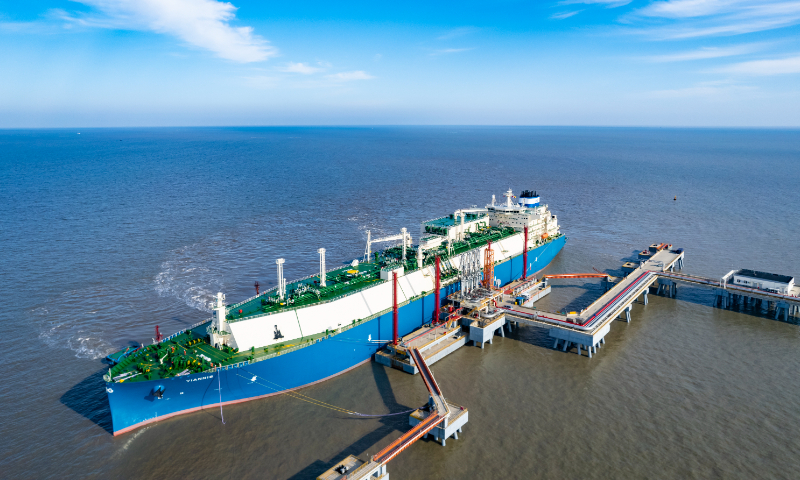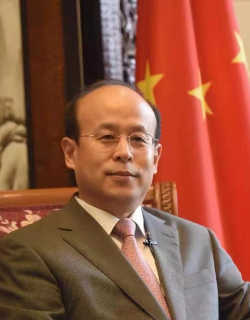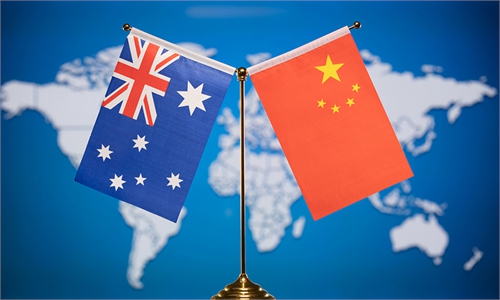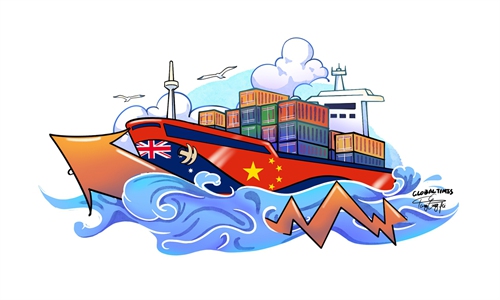Exclusive: China-Australia economic and trade ties facing important window period: envoy

A liquefied natural gas (LNG) carrier from Australia prepares to offload LNG at a port in Qidong, East China's Jiangsu Province on December 5, 2021. Photo: VCG
Editor's Note: Australian Trade Minister Don Farrell embarked on a visit to China on Thursday, adding to growing interactions between Chinese and Australian officials following a meeting by the countries' top leaders in Bali, Indonesia in November 2022. After years of tensions due to a series of hostile moves by the previous Australian administration against China, bilateral relations are showing signs of improvement. Still, differences and hurdles remain. How should the two sides overcome such hurdles to further improve ties? In an exclusive interview with Global Times reporter Yin Yeping (GT), Chinese Ambassador to Australia Xiao Qian (Xiao) said that bilateral economic and trade relations now face an important window of opportunity.
The Chinese Ambassador to Australia Xiao Qian Photo: Courtesy of the Chinese Embassy in Australia
GT: How do you view the current China-Australia relationship?
Xiao: Since the Australian Labor Party government took office, with the joint efforts of both sides, there have been frequent high-level interactions and close practical cooperation in various fields between the two countries. China-Australia relations have significantly improved and stabilized. In November of last year, President Xi Jinping and Australian Prime Minister Anthony Albanese successfully met during the G20 Summit in Bali, Indonesia, and pointed out the direction for the next stage of development in the relationship between the two countries. President Xi stated during the meeting that both as important countries in the Asia-Pacific region, China and Australia need to improve, uphold, and further develop the relationship.
I believe that the term "improve" refers to the fact that there are still some lingering issues between China and Australia, and both sides should work through dialogue to resolve these issues. The term "uphold" refers to the fact that there may be future disagreements between China and Australia, and both sides should manage such differences wisely and avoid letting these issues affect the overall atmosphere of the bilateral relationship. The term "further develop" refers to the fact that in addition to current cooperation between the two sides, both China and Australia should continue to deepen and expand their cooperation to benefit the two peoples.
Since the beginning of this year, Chinese Foreign Minister Qin Gang and Australian Foreign Minister Penny Wong had a fruitful meeting during the G20 Foreign Ministers' Meeting. Chinese Vice Foreign Minister Ma Zhaoxu recently visited Australia and held political consultations with Australian Department of Foreign Affairs and Trade secretary Jan Adams. The trade ministers of both countries also held a video conference and consultations at multiple levels, making certain progress on trade issues such as barley. Currently, Australian Trade Minister Don Farrell is visiting China. Exchanges and cooperation between the two countries in the fields of economy and trade, science and technology, education, military affairs, agriculture, law enforcement and local government cooperation are also gradually restarting.
At present, the relationship is at a critical juncture of development, and the two sides have important consensus on jointly maintaining the positive momentum of the development of this relationship. The healthy and stable development of China-Australia relations conforms to the fundamental interests of the two peoples, and is also conducive to promoting peace, stability and prosperity in the Asia-Pacific region and the world. China is willing to work together with Australia to implement the consensus reached by the leaders of the two countries and improve, uphold, and further develop bilateral relations.
GT: Australian Trade Minister Don Farrell is visiting China. What are your comments about his visit? Will there be more official exchanges including high-level visits between China and Australia in 2023?
Xiao: On February 6, Chinese Minister of Commerce Wang Wentao held a video meeting with Farrell upon Australia's request. The two sides conducted professional, pragmatic, and candid exchanges on implementing the important consensus reached by the leaders of the two countries in Bali, properly handling each other's key economic and trade concerns, and planning and developing China-Australia economic and trade relations in the next stage.
At present, China-Australia economic and trade relations are facing an important window period. During Farrell's visit to China, the Chinese and Australian economic and trade ministers will conduct in-depth exchanges on issues of mutual and common concern and discuss future cooperation. I look forward to Farrell's visit to China to further promote Australia's practical cooperation with China and benefit the two peoples.
The recent gradual resumption of exchanges and cooperation between China and Australia in various fields fully demonstrates that although the two sides have some differences, they have a strong desire for communication and exchanges and extensive and profound common interests.
This year is a crucial year for China-Australia relations to stabilize and develop for the better. We are willing to work with the Australian side to earnestly implement the important consensus reached at the Bali meeting between the two leaders and the outcomes of China-Australia diplomatic and strategic dialogues, maintain high-level exchanges and expand mutually beneficial cooperation based on the principles of mutual respect, mutual benefit, and win-win results, and seek common ground while reserving differences.
We are willing to jointly increase trust and dispel doubts in exchanges and cooperation, and properly manage and control differences, while guiding bilateral relations back on the right track.
GT: You have visited many places and interacted with many people in Australia, what impressed you the most?
Xiao: Since last year, I have visited various places in Australia such as New South Wales, Victoria, Western Australia, Queensland, and Tasmania, and have had in-depth exchanges with local businesspeople about bilateral relations and practical cooperation between the two countries. I deeply feel that people from all walks of life in Australia are eagerly looking forward to the relationship between the two countries returning to the right track and the resumption of normal friendly cooperation.
Over the past few years, China-Australia relations have encountered difficulties and setbacks, which we do not want to see. There is no fundamental conflict of interest between China and Australia, and no historical grievances. The two countries have every reason to be friends and partners. At present, with the joint efforts of both sides, the relationship between the two countries has stabilized and improved, and practical cooperation in various fields has been steadily advanced. In particular, the economic and trade cooperation between the two countries has thawed and recovered.
At the end of last year, the Australian Foreign Minister visited China and jointly issued the China-Australia Foreign and Strategic Dialogue Joint Outcomes Statement with the Chinese side. The two sides agreed to support the China-Australia CEO Roundtable and visits by bilateral business delegations, which was widely welcomed by Australian companies.
Recently, the premiers of Victoria and Western Australia paid successful visits to China respectively, during which they reached important consensuses and achieved practical progress with China on deepening practical cooperation. These exchanges and cooperation have greatly promoted the understanding and friendship between the two peoples, and provided a solid foundation for the development of bilateral relations.
I sincerely hope that the two sides will further expand and deepen friendly exchanges and mutually beneficial cooperation in various fields, and promote each other's economic prosperity and social development for the benefits of the two countries and the two peoples.
GT: How will the AUKUS agreement affect China-Australia relations? Will Australia's stance on the Taiwan question affect the development of bilateral ties?
Xiao: China is firmly opposed to the AUKUS clique of the US, the UK and Australia, which is pushing forward a nuclear-powered submarine program and coercing the International Atomic Energy Agency to endorse it.
It should be pointed out that the AUKUS nuclear submarine cooperation carries significant nuclear proliferation risks. The US, the UK and Australia nuclear submarine cooperation sets a bad precedent, which will have a negative impact on the settlement of regional nuclear hotspot issues.
The Taiwan question concerns China's core interests and is not subject to any external interference or political manipulation. The one-China principle is central to China's core interests, the red line and bottom line that cannot be crossed, the political basis upon which China conducts exchanges with other countries, and the general consensus of the international community.
China-Australia relations are based on mutual respect and mutual trust. Both parties must stick to political principles. The current momentum of improvement and development in China-Australia relations is in the fundamental interests of the two countries and the two peoples.
China is willing to work with Australia to implement the important consensus reached by the leaders of the two countries, enhance mutual trust, deepen cooperation, properly handle differences, and promote the sustained, healthy and stable development of China-Australia relations.
At the same time, it is hoped that the Australian side will earnestly abide by the one-China principle, an important prerequisite and political basis for improving, upholding, and further developing China-Australia relations, and earnestly respect each other's core interests and major concerns.
GT: How do you view the complementarity between China and Australia in the economic and trade fields? What are your expectations for China-Australia economic, trade, and investment cooperation?
Xiao: China and Australia are important economic and trade partners to each other. The economic structures of the two sides are highly complementary, and the bilateral economic and trade cooperation is mutually beneficial and win-win. Australia is a long-term and stable supplier of minerals and energy resources to China, and China is a competitive commodity supplier to Australia. The practical cooperation between the two countries has formed a close interdependent relationship.
At present, the global industrial and supply chains face disruption, and trade and investment activities continue to slump. China-Australia practical cooperation is not only conducive to the stable economic development of the two countries, but also has special significance for China and Australia to cope with global economic challenges.
The two countries have broad prospects for cooperation in both traditional and emerging fields such as addressing climate change and renewable energy.
In traditional fields such as infrastructure, manufacturing and agriculture, Chinese enterprises have accumulated operational strength and rich experience. The two parties have cooperated extensively and can seize opportunities for further development in the future. In emerging fields, the two countries' trade ministers held talks in February and reached a consensus on further expanding cooperation in areas such as climate change and renewable energy. The governments of both countries have proposed positive carbon emission reduction goals and formulated effective measures to promote the realization of these goals. Moreover, relevant enterprises of the two countries have great potential for cooperation in capital, technology, talents, markets and other aspects.
Since the beginning of this year, with the implementation of optimized anti-epidemic policy, China's domestic consumption has recovered rapidly, and the Chinese economy has shown strong resilience and a stable and sound development trend.
As the trade between China and Australia is highly complementary and with the recovery of consumption and economic growth, the demand for each other's products will rise steadily.
A large number of high-quality and affordable industrial products and consumer goods produced in China will help Australian consumers reduce costs of living and curb inflation. A large number of high-quality and competitive Australian products will also usher in more opportunities for exports to China.
GT: Some foreign media have hyped Australia being the biggest target of the so-called China's economic coercion. What is your view on this?
Xiao: The so-called economic coercion by China against Australia is completely false.
In my opinion, Australia's concerns fall under these circumstances: First, the Chinese government has conducted anti-dumping and anti-subsidy investigations into certain imported goods from Australia at the request of relevant domestic industries. The relevant processes are conducted in strict accordance with Chinese laws and WTO rules. Second, Chinese people were angry at the wrong words and deeds of the previous Australian government and were unwilling to buy Australian goods and services. Third, due to a series of actions by the Australian side, some Chinese companies have become more cautious and vigilant about cooperation with Australia, and their willingness and confidence to invest in Australia have declined, and thus they have made their own decisions. Fundamentally speaking, this is all a response to the wrong words and deeds of the previous Australian government.
At present, China-Australia relations are showing a momentum of stable and sound development, and bilateral economic and trade relations are facing an important window period. The two sides should make joint efforts to inject more positive factors into economic and trade cooperation.
Recently, China and Australia jointly sent a letter to the WTO to suspend the dispute over anti-dumping and countervailing duties on barley, reflecting the spirit of mutual benefit and cooperation. China's "two sessions" this year made it clear that China will continue to promote high-level opening up, which I believe will bring more opportunities to countries around the world, including Australia.
GT: China is one of the most important international markets for Australia's tourism industry. What is your view on tourism cooperation between the two countries and the prospects for the recovery of the tourism industry in 2023?
Xiao: China and Australia have cooperated in the field of tourism for a long time and have a good foundation. It is an important part of people-to-people and cultural exchanges and practical cooperation between the two countries.
In 1997, China approved Australia as a destination for Chinese citizens to travel abroad at their own expense. Since then, tourism cooperation between the two countries has continued to deepen, and a cooperative working mechanism has been established. In the next step, as the relationship between the two countries stabilizes and improves, China will further strengthen communication and exchanges with Australia on the existing basis, and continue to create new prospects for China-Australia tourism cooperation.
I believe that as China optimized the epidemic prevention and control measures and the number of flights between the two countries resume in an orderly manner, traveling activities like family visits, vacations, sightseeing tours and business trips will gradually return, and Chinese citizens will be more enthusiastic about traveling to Australia. There will be a significant increase in the number of tourists in 2023.
GT: How do you view future cooperation between China and Australia in the education sector?
Xiao: People-to-people and cultural exchanges between China and Australia have a long history and a solid foundation. The friendship between the two countries lies in the friendship between the two peoples. Talent exchange and educational cooperation have always been an important part of China-Australia people-to-people and cultural exchanges.
The COVID-19 epidemic and the difficulties experienced in China-Australia relations in the past few years have had a certain impact on Australia's international education market. China remains Australia's largest source of international students. Recently, the Chinese Ministry of Education has adjusted its policies to encourage Chinese international students to return to overseas universities and resume their studies through face-to-face teaching. In addition, as China-Australia relations stabilize and improve, various levels of the education sectors in both countries are carrying out and restarting productive mutual visits and exchanges.
I believe that the number of Chinese students studying in Australia will gradually pick up. At the same time, China welcomes outstanding Australian students to study in well-known Chinese universities by applying for Chinese Government Scholarship and New Colombo Plan Scholarship.
In addition, there are wide prospects for cooperation in the field of scientific research between China and Australia. Currently, China is Australia's second-largest international scientific research partner.
Furthermore, the two countries have great potential for cooperation in the areas of clean energy, environmental protection and health, with shared interests and vast prospects for collaboration.



